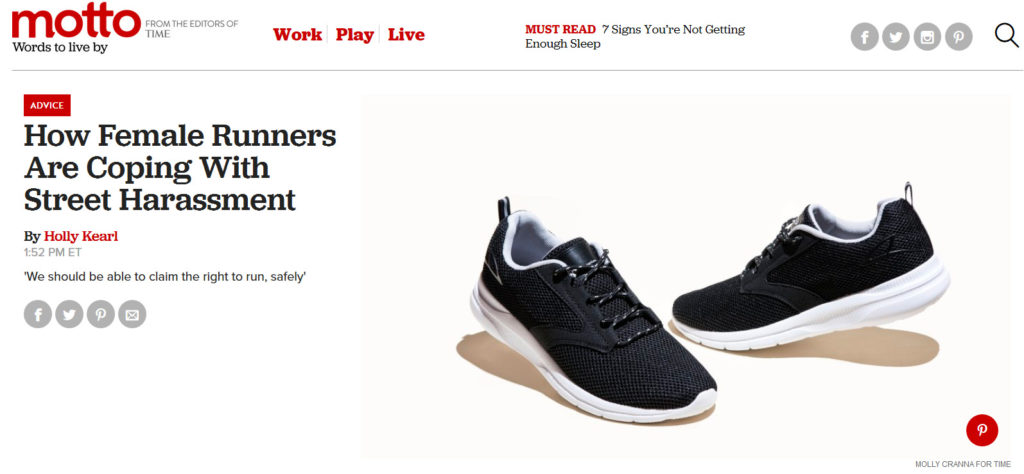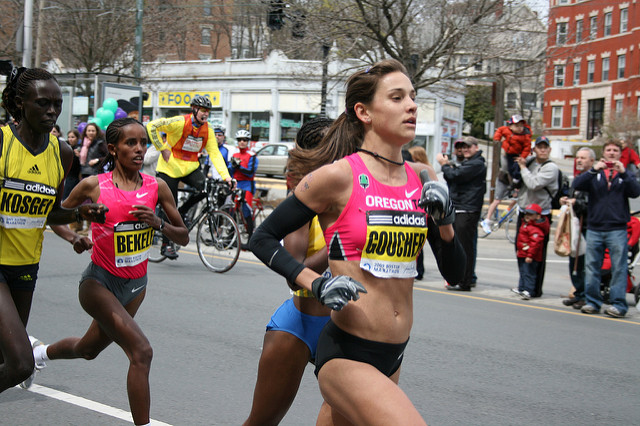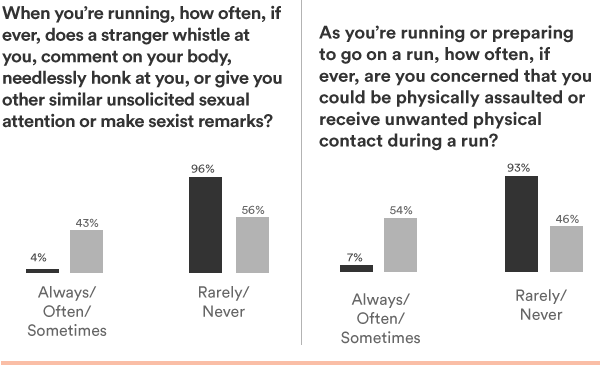 An October 2016 Runner’s World survey shows that street harassment is a problem for many, many women (and a few men). I wrote about this problem in a new article for TIME Magazine’s MOTTO section – read it here.
An October 2016 Runner’s World survey shows that street harassment is a problem for many, many women (and a few men). I wrote about this problem in a new article for TIME Magazine’s MOTTO section – read it here.
As part of my research for the article, I interviewed U.S. Olympian (x2) Kara Goucher and Runner’s World editor Meghan Kita, who oversaw the survey. I could only include a small portion of their interviews in the article, but because I thought they had many important things to say, they gave me permission to print more of their interviews here.
KARA GOUCHER:

First up is Kara Goucher, who in addition to running in two Olympics, has achievements that include: winning a NCAA Cross Country championship in 2000, winning the bronze medal in the 10,000m at the IAAF World Championships in 2007, and having the fastest-ever marathon debut for a woman in the world with 2:25:53 in New York City in 2008.
I falsely assumed that she must have a crew of people running with her and therefore, perhaps rarely or never experienced street harassment. I was wrong. Just like every other female runner I know, she’s faced harassment. Safety concerns impact her training regiment.
HOLLY: How old were you when you first began running?
KARA: I ran my first race at age 6, but started organized running at age 12.
HOLLY: Have you faced sexual harassment and/or had safety concerns during your running career?
KARA: Cat calls and whistles are common place. There have been times in my life where I actually felt threatened. I think that most women can relate to this.
HOLLY: What’s one specific example of sexual harassment you’ve experienced while running? How did it make you feel? What did you do when it happened?
KARA: The first time I felt truly scared was in 2000. Adam and I had qualified for the finals in the 5000 meters at the Olympic Trials that were held in Sacramento. We, along with our coach, had headed to Lake Tahoe to get away for a few days before the final. We arrived in Lake Tahoe as the sun was setting. We set off for our runs and Adam quickly ran away from me. A few minutes later a truck came along side me with two men inside. They started whistling and calling out to me. I turned down a road and started running as fast as I could. They drove off. But a few blocks later they turned onto the road I was on and started yelling out to me, harassing things. I was terrified. I sprinted back to our hotel and didn’t finish my run. That night I had nightmares about it. I have been followed running since, but that first time really stands out as the time I realized I was very vulnerable when I was out running alone.
HOLLY: Has sexual harassment and/or safety concerns affected your running career in any way? If so, how?
KARA: Absolutely. I am nervous when I run before sun up or after sun down. I try to follow paths that are lit or are naturally busier with other runners. I used to run on a beautiful single track trail in Portland, OR, until my coach informed me that his wife was chased by a man running there. I was too frightened to go back on my own. I realized just how easy it would be for someone to attack me. I try to not let it control my life, but it does affect choices I make in training.
HOLLY: Is there anything else you want to say on the topic?
KARA: Running makes me feel strong and capable so I don’t like the way the vulnerability can take that from me. Running is the greatest joy in my life aside from my personal relationships. I’m not going to let anyone take that from me.
MEGHAN KITA:

Meghan Kita, a marathoner, has worked as an editor at Runner’s World for five years. After three women runners in three different states were murdered, a blog post about it on the Runners World website became the site’s most popular post to date. Meghan followed it up with a post, “The Problem is Not Women Running Alone,” which also generated a lot of discussion. From there, she spearheaded a survey about runner safety and street harassment, the first of its kind. Here is my interview with her:
HOLLY: When did you first begin running?
MEGHAN: In 2002, 14 years ago. I was in high school and joined the track team to get in shape for soccer. I liked it so much that I ran cross country in the fall instead.
HOLLY: What has been your experience with street harassment while running?
MEGHAN: It doesn’t happen that often and I marked “sometimes” in the survey. Maybe I’ll hear a honk per month. Partially this is because I run early in the morning. If it happens, it usually is when I’m running at lunch near work. It happens often enough that it’s irritating. And occasionally it has been more serve. I was followed twice one year. I was followed by someone in a car both times. I’m not totally clear they were following me but they were acting weird and I couldn’t figure out any other reason for their behavior. Both times I just got out of there. I’ve faced enough creepy behavior to be on high alert.
HOLLY: Has street harassment or general safety concerns affected your running career?
MEGHAN: Yes. I bought pepper spray after the 1st incident of following. I don’t carry it all the time, but I’ll carry it if I’m running early in the morning in parks when not that many people are around. Parks make me nervous as there’s not a quick way to get out. The second time I was followed, I didn’t have it as I didn’t think I was in danger. It just goes to show that harassment can happen anywhere and at any time and when you’re expecting it, it may not happen and vice versa. It’s unpredictable.
HOLLY: What are your thoughts on how street harassment and safety concerns cause most women to have different running experiences from men?
MEGHAN: Harassment feeds into pre-existing safety concerns. Every woman has been raised to think something bad can happen just because you’re a woman and may be an easier target, sexual violence is more of a likelihood for you. You’re already on high alert for that and street harassment reinforces that you’re vulnerable etc. Harassment keeps safety in the forefront of women’s mind even though it usually doesn’t lead to anything beyond annoyance.
It keeps us on high alert in a way that I don’t think men’s experience. There are several running routes men have recommended and I’ll spend the entire time thinking, there are woods on left and river on the right and the best way to get off the trail is 3 miles ahead, how is this fun? What if someone pops out and I would have to out run them? This thinking hinders my enjoyment of remote areas that men seem to enjoy running. I wish it wasn’t that way but it is self-preservation. You hear terrible stories, see men reacting badly and why wouldn’t you have your guard up?
Many thanks to Kara and Meghan for sharing their stories. Thank you also to Meghan for spearheading the survey. Thank you to Runner’s World for taking the issue seriously. And thank you to our ally and friend Michelle Hamilton for writing an article about street harassment and the survey in the December issue of Runner’s World. It will be on newsstands soon!
You can also listen to a Runner’s World Podcast episode about this issue + share your stories with #HarassedMidRun.

